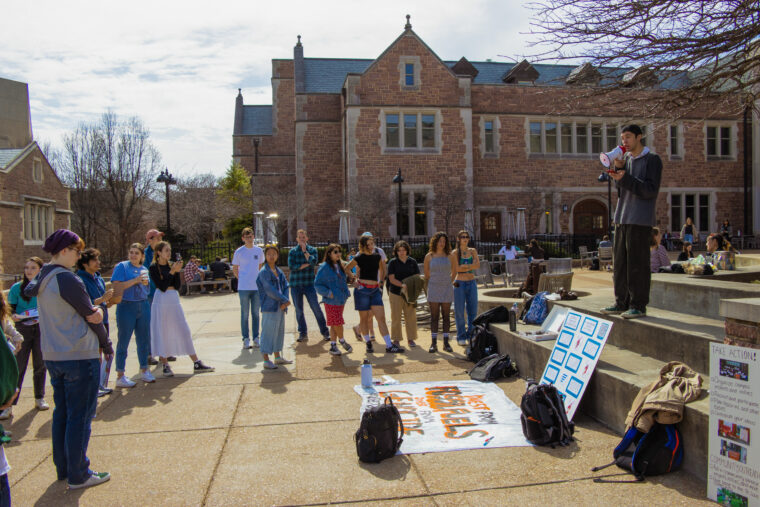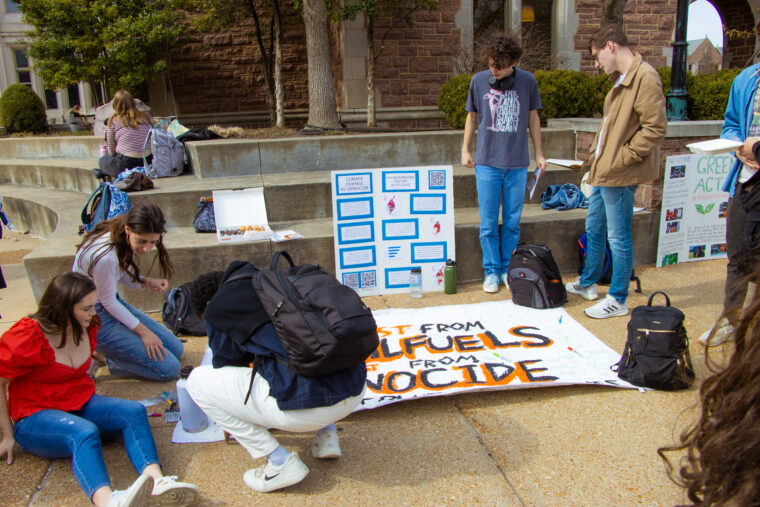News
Green Action rally demands University divestment from fossil fuels

Zoe Oppenheimer | Student Life
Green Action, an environmental justice and advocacy student group, held a rally calling on Washington University to divest from fossil fuels and recognize the impacts of environmental racism, March 1.
About 40 students and faculty congregated in the Danforth University Center (DUC) courtyard to listen to a series of speeches that called for transparency from the University about its investments, some of which are in fossil fuels. Green Action asked students to sign a banner that they hung in Tisch Commons.
Chancellor Andrew Martin made his most recent public comments on fossil fuel divestment in March 2020. He confirmed that the University’s endowment has “limited exposure to non-renewable resources and high carbon emission sub-sectors,” which include auto/air transportation and certain industrials/capital goods.
Martin explained that the University maintains its investment in fossil fuels because leaders believe that the “best contribution to the advancement of the greater social good is through the financial support of the University’s mission.”
At the rally, speakers focused on the effects of fossil fuels on minority communities, reflecting Green Action’s newly adopted focus on environmental racism.
First-year Juliana Morera started off the rally with a speech that detailed the consequences that fossil fuels have on minority communities.
“Fracking, nuclear waste storage, and air pollution are part of a tradition of colonial genocide against Black, Indigenous, and Latine populations,” Morera said. “Here we are watching these corporations burn a planet with the knowledge that our college directly funds these industries that take human life.”
Morera listed Green Action’s demand for the University.
“We demand divestment from the fossil fuel industry,” Morera said. “No profiting from environmental degradation, no profiting from war.”
Sophomore Alex Herzig, a member of Green Action’s executive board, echoed the sentiment that investing in fossil fuels harms communities of color. They spoke about the environmental issues that they believe are caused, in part, by funding from universities like WashU.
“The majority of air pollution sources are placed purposefully in predominantly Black neighborhoods, and the majority of illegal dumping takes place in these neighborhoods as well,” Herzig said.
“The perpetrators behind these heinous policies [are] companies like Ameren, companies like Spire with whom Washington has close financial relationships, companies whose names are proudly displayed in the gaudy exhibits at the basement of the Knight Center.”
Herzig said that WashU needs to stop investing in “companies that profit off of the targeting of marginalized communities.”
Additionally, anthropology professor Bret Gustafson spoke at the rally, detailing WashU’s involvement in the fossil fuel industry.
“Washington University directly contributes to violence against all of us,” Gustafson said. “Everybody breathes the toxic impacts of burning coal to produce electricity.”
Gustafson also expressed how he feels as a faculty member who represents the University.
“It’s really quite embarrassing to be a faculty member at WashU,” Gustafson said. “It should be [embarrassing] for students and alumni to be associated with a University that’s really far behind a lot of things.”
Gustafson also spoke to the fact that although Chancellor Martin wants to protect WashU’s finances, there are options for investment other than fossil fuels.
“When Chancellor Martin says they can’t do anything because they’re just trying to protect the money for the University, there are plenty of other places you can invest your money in this fairly sick capitalist system that we live in,” Gustafson said.
Students who attended the rally had varied opinions on the effort to divest from fossil fuels. Sophomore Oliver Smith attended the rally after seeing it take place outside the DUC.
“I also think that WashU is behind the times compared to other universities,” Smith said. “I’m from Michigan, and my university at home has divested from fossil fuels.”
Universities such as Harvard, Yale, and the University of California system have removed fossil fuels from their investment portfolios after being pressured by student-led lawsuits.
“The University has to care about the students,” Smith said. “We’re the students the administration is supposed to serve. So coming out and showing what our values are, I think that’s good.”

Zoe Oppenheimer | Student Life
Junior Cochise Burrows said that he didn’t know much about divestment before being asked to attend the rally by a Green Action member. He said that, though he does not fall strongly on either side of the divestment issue, he thinks Green Action should have put forth a solutions-based plan.
“I don’t see any suggestions of where the money should go,” Burrows said. “Obviously, I understand; [the solution is] a bigger question, and you can recognize that there’s an issue with what’s being currently done without knowing exactly what should be done.”
Burrows added that it would have been helpful for Green Action to show what other industries the University could invest in instead.
Moving forward, Green Action leadership said that they want to increase the size of their organization, and they emphasize the need for diversity in their organization and environmental efforts more broadly.
“I think it’s no secret that we have a majority white base as of right now,” Herzig said. “That’s something that was pointed out at rallies in the past, and I think it’s certainly heard and felt.”
Herzig said that they hope Green Action’s increased focus on environmental racism will resonate with a more diverse group of students.
“The thing is, we’re not just looking for people for some sort of quotas,” Herzig said. “We want to foster a diverse environment, and the way to do that is to show that we are actually willing to take a stance on issues like environmental racism, that we’re willing to stand up for these communities, people of color who are disproportionately affected by climate change.”
Herzig ended with a final speech demanding change from WashU’s administration.
“We are done with inaction, done with ignorance, and done with the disregard for human life,” Herzig said. “By signing this banner with us today, you stand with us in solidarity to protect the lives of Indigenous Americans, Black Americans, and Latine Americans. You stand with us against genocide. I’m left with only one question for WashU’s administration. Do you?”
